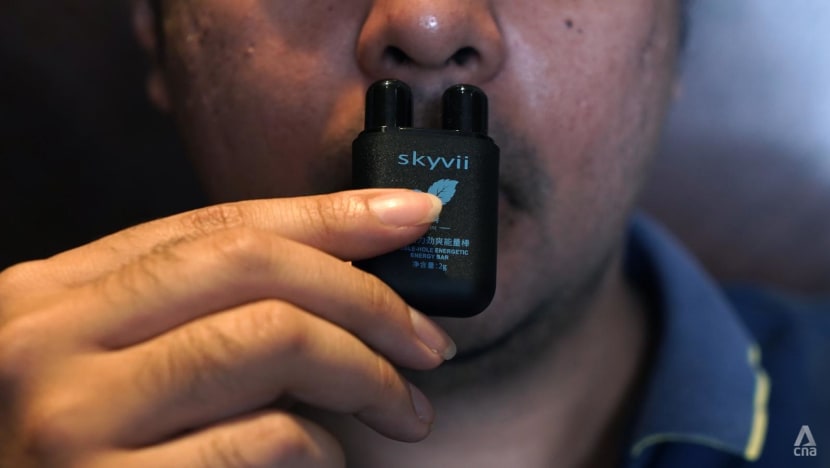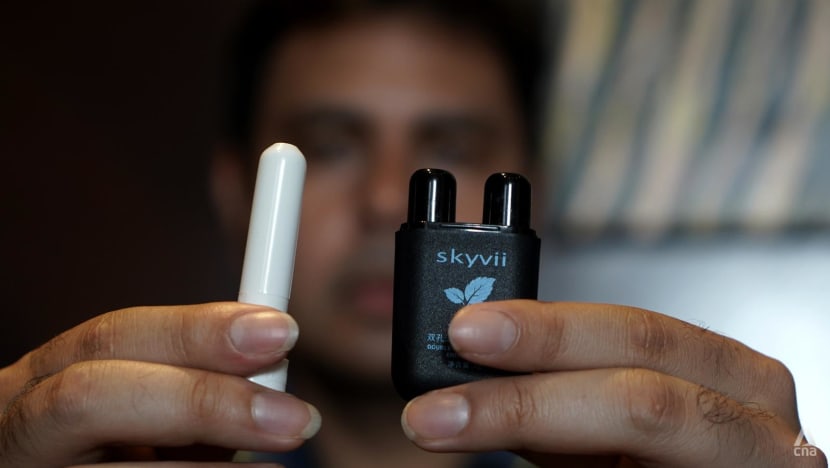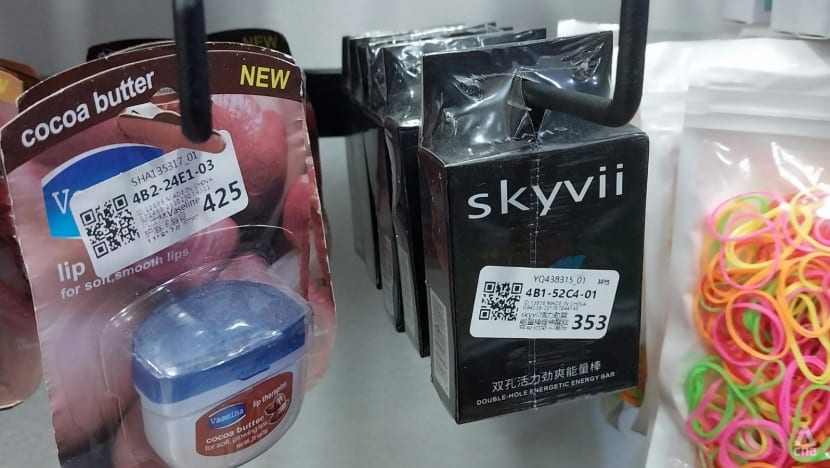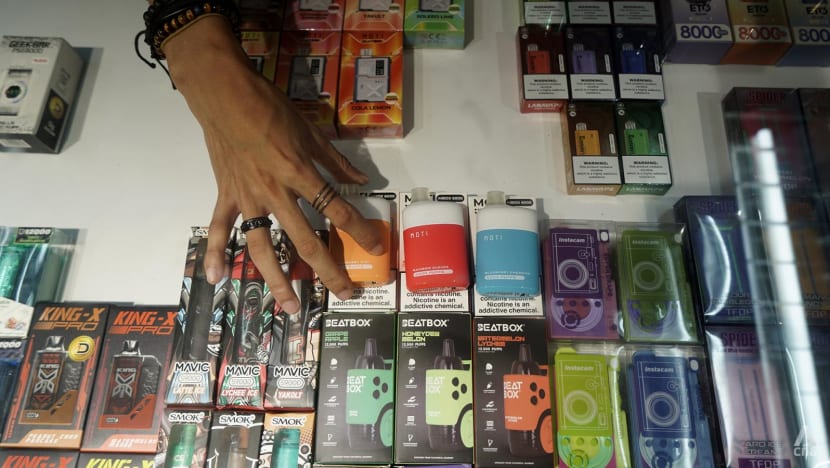Children in Malaysia inhaling ‘energy sticks’: Experts urge outright ban to nip problem in the bud
These cheap inhalers come in candy flavours, appealing to the young. Malaysia should draw lessons from the vaping scourge and tackle the problem early, experts say.

Energy stick inhalers have gained popularity in Malaysia in recent months. (Photo: CNA/Zamzahuri Abas)

This audio is generated by an AI tool.
JOHOR BAHRU: They are brightly coloured nasal inhalers that claim to give users an energy boost.
Resembling Airpod cases, these “energy sticks” come in a variety of fruity flavours including mint, peach, grape and even bubblegum.
They are easily found on e-commerce platforms such as Lazada and cost RM2.50 (US$0.52) to RM16 a pop.
But it is unclear exactly what substances the sticks contain, and their popularity among schoolchildren is raising concern among health experts in Malaysia who worry that, like vaping, the sticks could become a gateway to drug abuse.
The trend of children using these nasal inhalers was first reported in China late last year. News outlet South China Morning Post reported in November that the inhalers were selling in the thousands, with secondary school students forming the majority of customers for one online store.
According to reports, the two-pronged inhalers come in a range of fragrances and contain essential oil, menthol, camphor and, in some instances, alcohol.
While most of the inhalers sold on e-commerce platforms in Malaysia appear to be imported from China, their precise contents are not known because they are not registered with Malaysia’s National Pharmaceutical Regulatory Agency or the Ministry of Health.

“Everything about the product has to be mentioned in the registration process, so we know what are the precise contents and their nature, so that everyone knows – the regulatory agency, the healthcare professional as well as the public,” Professor Amrahi Buang, president of the Malaysian Pharmacists Society, told CNA.
Without being registered, the safety, quality and efficacy of the energy sticks are in question, he said.
Based on research by laboratories in China, these products may contain lead, mercury, menthol and nicotine that could be harmful to the respiratory system and lungs, noted Professor Sharifa Ezat Wan Puteh, a health economist and public health specialist with Universiti Kebangsaan Malaysia.
“These energy sticks are basically inhaled, because you put them inside your nostrils ... it goes through your mouth, goes through your throat and it goes into your lungs,” she said. “What happens in the lungs is the thing that … a lot of us are very apprehensive about.”
According to the United States’ Centers for Disease Control and Prevention, inhaling synthetic camphor – a common fragrance in the inhalers – can cause nausea, vomiting, dizziness, and irritation to the eyes, skin, or mucous membrane.
Some of the sticks may contain vitamin E acetate, an additive also found in e-cigarettes, said Prof Sharifa Ezat.
GATEWAY TO OTHER VICES?
The concerns around energy sticks echo that for vapes or e-cigarettes, which have become popular among youths despite the harm they can cause.
Like vapes, the inhalers appear targeted at children, given their affordability and trendy packaging, noted Prof Amrahi.
“(Manufacturers) focus on the younger generation, trying to sell inhalers as a cool lifestyle akin to smoking and vaping. To make it even more accessible, they are available online and can be delivered in bulk. It’s challenging to control the sale of it,” he added.
Vaping has given rise to e-cigarette or vaping product use-associated lung injury, or Evali, which has caused thousands of people to be hospitalised in the US, as well as deaths, noted Prof Sharifa Ezat.
According to the US CDC, vitamin E acetate is strongly linked to the Evali outbreak.
In June 2023, Malaysia’s then-health minister Zaliha Mustafa said that a 16-year-old girl with a three-year vaping history died from acute heart failure with pulmonary embolism in a probable Evali case.
“Evali was actually (an) example of illegal marketing and illegal products being put inside respiratory products, and this basically contaminated many youths. So the same thing can happen with your energy sticks. That's the problem,” Prof Sharifah Ezat said.
The inhalers also open the door for children to develop addiction to other products like conventional cigarettes, e-cigarettes and illegal substances like cocaine which are inhaled, the experts said.
While vapes and cigarettes are known to contain nicotine, there are no concrete studies that show inhalers also have the addictive substance, Prof Sharifa Ezat noted. But until there is conclusive evidence, it is not safe for children or adults to consume these energy sticks, she said.
“These inhalers might be a gateway for children to snort drugs and that is a worry,” she added.

AUTHORITIES PLEDGE ACTION, STEP UP CHECKS
Malaysian authorities have pledged swift action to curb children's access to these inhalers.
“I have received multiple direct alerts on it (energy sticks). I have already informed the (health) director-general and deputy director on the issue and we will take action soon,” Health Minister Dzulkefly Ahmad said earlier this month.
CNA found the inhalers for sale at some mini marts and cigarette stores in Johor Bahru.
One store owner who only wanted to be identified as Mr Raj said the sticks are popular with children and stocks would run out fast.
“We previously had five different flavours, but within days they were mostly sold out and now we only have the mint (flavour) left,” said Mr Raj.
“We don’t stop children from buying because the law doesn’t require us to only sell them to adults, like cigarettes,” he added.
The inhalers he sells are of the Skyvii brand and priced at RM5 each. Three ingredients are listed in Chinese on the box: menthol, borneol (a derivative of terpene, which is a primary constituent of essential oils) and plant essential oils. A warning label also states that children may only consume the product “under adult supervision”.
Government efforts are underway to curb their sale.
The health ministry has stepped up checks on e-commerce platforms and urged “local and foreign sellers” to remove their advertisements, said health director-general Dr Muhammad Radzi Abu Hassan.
He warned that those who sell unregistered health products are in breach of Rule 7(1) (a) of the Control of Drugs and Cosmetics Regulations 1984 and, if found guilty, could face a fine of up to RM25,000 and up to three years’ jail for the first offence.
As of Feb 20, ads for the inhalers were still on Lazada Malaysia, CNA found. However, ads for the products that were previously on Shopee Malaysia had been removed.

Experts believe more can be done to nip the problem in the bud.
“The best solution is an outright ban,” said Professor Amrahi.
“We should learn from the vape issue. In 2015, pharmaceutical experts urged the government to ban it but it was not done. Now eight years later, the repercussions are huge and it is now a RM2 billion-a-year industry, and Malaysia has become an exporter,” he added.
The health, education and even digital ministries should synergise efforts to eradicate the sale and distribution of these energy sticks, he suggested.
“We are talking about a one-government, one-society approach to address this new addiction that can create huge health problems for an entire generation,” he said.


















